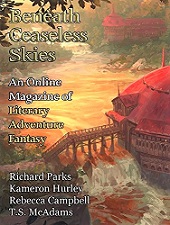 Beneath Ceaseless Skies #235, September 28, 2017
Beneath Ceaseless Skies #235, September 28, 2017
(Ninth Anniversary Double Issue)
“On the Road to the Hell of Hungry Ghosts” by Richard Parks
Reviewed by Stephanie Wexler
Pan Bao, his daughter Jing, and Mei Lei, a snake-devil turned human, are traveling to answer a call of service to the east in “On the Road to the Hell of Hungry Ghosts” by Richard Parks. Little is known why Mei Lei settled for a full-time human existence, but it doesn’t stop Exalted Governor in sharing the trio’s supernatural abilities. Too soon their journey is sidetracked by an apparition. It will take all of Pan Bao’s experience, Jing’s spry youth and Mei Lei’s open nature to discover the secret plaguing this ghost’s rest. Parks’ plot is simple and poignant if a little predictable. Despite the fast conclusion, Mei Lei’s innocent questions, ability to work with her companions and mysterious origins outshine the lackluster characters and plot.
Nev is a product of war in “The Fisherman and the Pig” by Kameron Hurley. We don’t know how long Nev has lived, because Nev doesn’t know either. He has swapped bodies so many times he is left with little more than horror induced awakenings on the battlefield. Now—his long war over—he attempts to live as a hermit with his only companions a turtle and a pig. Yet, Nev’s subtle life suddenly becomes an experiment to eliminate him and others like him. Nev admits he wants to die, but fear and survival keep him jumping. Kameron’s post-war vision resonates on so many levels; ethics, the value of human life, and the dangers of playing god. Yet, life no matter what form, will soldier on.
Oskar, librarian/data collator/clerk has stayed on at Mundaneum to continue working even after everyone has fled in “The Fall of the Mundaneum” by Rebecca Campbell. The area Oskar works is slowly being occupied by an invading force. Family, colleagues, even the fleeing townspeople advise him to abandon his mission. Yet, he continues to answer queries, catalogue new information or keep the halls organized. Oskar is bold, charming and alarmingly in denial of what is happening. It is a true shame when he does leave, yet Campbell expresses the dear fellow’s triumph remembering the knowledge, literally carrying the passion for artifacts in his arms. Others will no doubt share Oskar’s grief of what was lost and hope of joy when a future Mundaneum will rise again.
Marcus in “Grassland” by T. S. McAdams has raised his dead brother (Ajax) to ferret out the whereabouts of Mithras, a totem deity, god of soldier’s virtues. Ajax was no walk in the park for Marcus. Yet, Marcus goes to some lengths to find Mithras, possibly to spite Ajax? Still, amid vampire encounters and skittish, unhappy cattle drovers, Marcus’s amazing insight of history, lore and people make this story a rich savannah, if taken in small pieces. The patchwork mysticism works well too, but there are too many inconsistent jumps and dead end ramblings between characters that create strange associations unbalancing the story. There is a thread of something greater here, but somehow the final intense act doesn’t deliver.